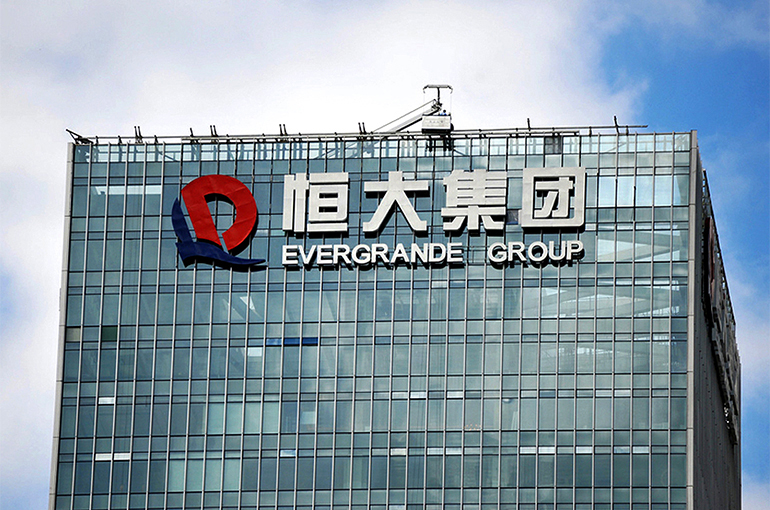 Chinese Developer Evergrande to Be Delisted From Hong Kong Bourse After 16 Years
Chinese Developer Evergrande to Be Delisted From Hong Kong Bourse After 16 Years(Yicai) Aug. 13 -- China Evergrande Group, a once high-flying real estate developer now beset by a debt crisis and a court-ordered liquidation, will be delisted from the Hong Kong Stock Exchange on Aug. 25, marking the end of its 16-year tenure as a publicly traded company following an 18-month trading suspension.
Evergrande was notified that the HKEX will cancel its listing after the builder failed to meet any resumption guidance requirements and trading in its shares remained suspended past July 28, the Shenzhen-based company announced in an exchange filing yesterday. Evergrande said it has no intention of applying for a review of the decision.
Under the HKEX’s fast-track delisting method, if a main board stock remains suspended from trading for 18 straight months, the exchange can cancel its listing. Evergrande was suspended following a winding-up order issued by the Hong Kong High Court on Jan. 29 last year. The deadline for its shares [HKG: 3333] to resume trading was July 28.
Evergrande’s delisting can be seen as part of a wider shake-out in Hong Kong’s stock market. Since 2018, 167 main board companies have been forced off the exchange, averaging more than 30 a year between 2022 and 2024. Ten were shown the door in the first half of this year.
Liquidation Update
In its delisting announcement, Evergrande also included a progress report on the firm’s liquidation, covering the period from Jan. 29, 2024 to July 31, this year.
“At this stage, and consistent with the announcements made by them since their appointment, the liquidators believe that a holistic restructuring will prove out of reach, but they will, of course, explore any credible possibilities in this regard that may present themselves," the report said.
The Hong Kong High Court appointed Edward Middleton and Tiffany Wong, managing directors of consulting giant Alvarez and Marsal Asia, as Evergrande's liquidators. They have divided their work into four main tasks: exploring the feasibility of a restructuring; identifying assets, bringing them under their control, and converting them into cash; investigating the causes of the insolvency; and engaging with creditors to assess and verify claims against the company.
So far, recoveries have been modest in the context of Evergrande’s overall balance sheet but still substantial, amounting to about HKD2 billion (USD255 million), according to the report. Only HKD81.7 million (USD11 million) came from assets held directly by the company, with the rest originating from subsidiaries.
The liquidators have launched multiple investigations, but declined to provide details, noting that it would be inappropriate to comment on matters before the courts.
In their dealings with creditors, the liquidators are seeking proofs of debt. As of July 31, they had received 187 submissions totaling roughly HKD350 billion (USD45 billion). This includes USD27.5 billion in liabilities disclosed in the company’s last standalone audited financial statements at the end of 2022.
“This figure is not to be taken as being final as, first, the claims' discovery exercise does not operate as a final bar date by which creditors had to make claims, so additional claimants are able to, and may yet, come forward and, secondly, claims already received are subject to formal adjudication in due course by the liquidators,” the report noted.
From Hero to Zero
Evergrande went public on the HKEX in 2009, with a market capitalization exceeding HKD70 billion (USD8.9 billion), making it the largest Chinese mainland-based private developer listed in Hong Kong. By 2016, the company was China's largest builder with sales of CNY373.4 billion (USD52 billion), putting it into the Fortune Global 500 List.
The following year marked Evergrande’s zenith, with assets of CNY1.76 trillion (USD245 billion), sales exceeding CNY370 billion, and net profit of CNY40.5 billion (USD5.6 billion) -- all industry-leading figures. That same year, founder Xu Jiayin, also known as Hui Ka-yan in Cantonese, topped the Hurun Rich List with a personal fortune of CNY290 billion.
But China’s property market downturn hit in 2020, and Evergrande announced plans to pare debt and rein in expansion. But it was too late. Evergrande's liquidity crisis erupted the following year, its commercial paper repayments faltered, Evergrande Wealth collapsed in the September, and a sweeping offshore debt restructuring began in the December.
By July 2023, Evergrande revealed losses exceeding CNY800 billion (USD111.4 billion) for 2021 and 2022 combined, the most in Chinese corporate history. As of Dec. 31, 2022, total liabilities had ballooned to CNY2.44 trillion (USD339.7 billion).
Xu was detained for suspected crimes in September 2023. In May last year, China's securities regulator imposed administrative penalties on Evergrande Real Estate for fraudulent bond issuance, fining the unit CNY4.2 billion (USD584.7 million) and imposing the maximum penalty of CNY47 million (USD6.5 million) on Xu, along with a lifetime ban from the securities market.
A winding-up petition was filed in June 2022 by Top Shine Global of Intershore Consult Samoa, which claimed Evergrande owed it HKD860 million (USD109.6 million). The builder repeatedly requested hearing delays to prepare a debt restructuring plan, prolonging the process. In January last year, the Hong Kong High Court ordered Evergrande to wind up for failing to make substantial progress with its plan.
Editor: Futura Costaglione